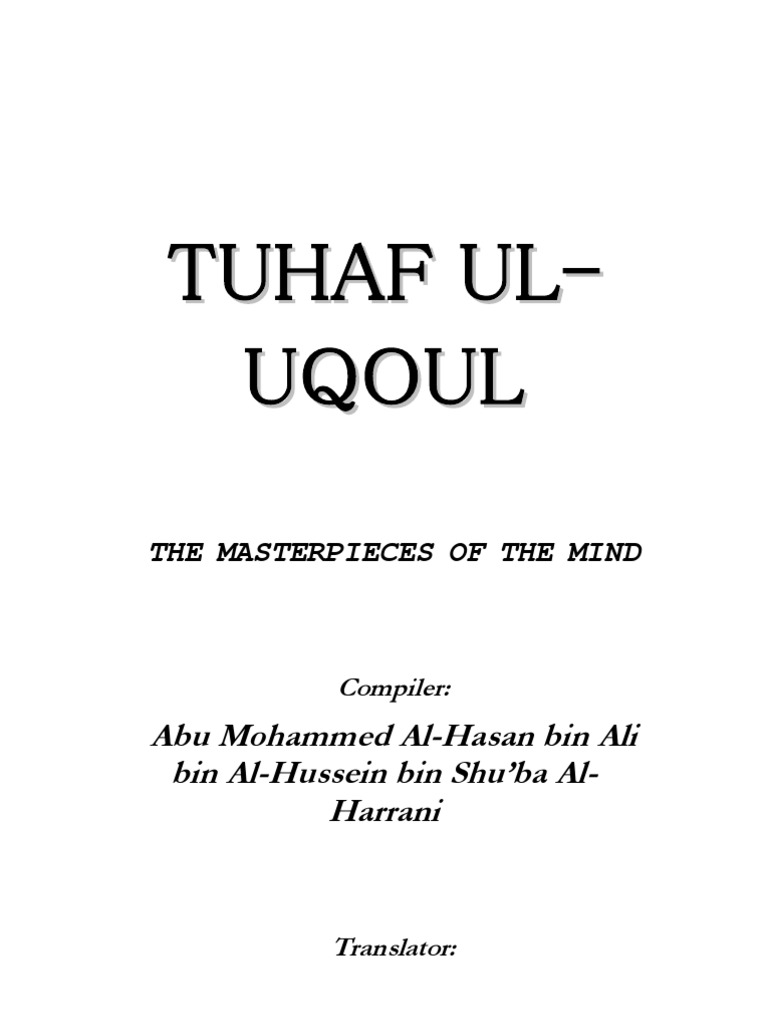The exploration of Shia teachings is fundamentally intertwined with the reverence attributed to the Imams, particularly in texts that illuminate their profound wisdom and teachings. One such remarkable tome is "Tuhaf al-Uqul," a compendium that encapsulates the narrations and sayings of the Ahlulbayt (the family of the Prophet Muhammad). This work operates not merely as a repository of information but as an invitation to delve into the intricate layers of Islamic thought and spirituality.
At its core, "Tuhaf al-Uqul" embodies the Shia perspective on life, ethics, and spirituality. The term "Tuhaf al-Uqul," which translates to "Treasures of the Intellects," aptly signifies the depth and profound nature of the teachings contained within. This text draws attention not only for its theological significance but also for its philosophical underpinnings, challenging readers to confront the complexities of faith and reason. It acts as a bridge, connecting the historical wisdom of the Imams with contemporary existential inquiries.
One compelling observation regarding "Tuhaf al-Uqul" is its pervasive appeal across diverse readerships, from scholars to laypersons. The fascination with this text can be traced back to several interrelated themes. First and foremost is the universality of the Human Experience. The narrations encapsulated within its pages resonate with the fundamental concerns of humanity: morality, grief, happiness, and the quest for meaning. This universality fosters a connection whereby readers can find solace and guidance amidst their personal struggles.
Furthermore, what distinguishes "Tuhaf al-Uqul" is its meticulous alignment with the broader sociopolitical context of the Shia community throughout history. The tenets articulated by the Imams within this compilation serve as both a beacon of guidance and a compass for ethical conduct in turbulent times. The teachings elucidate not merely individual piety but also communal responsibility, thereby acknowledging the collective dimension of faith—a salient aspect that has captivated adherents for generations.
The structure of "Tuhaf al-Uqul" further enhances its appeal. It is systematically categorized according to various themes, including but not limited to theology, morality, justice, and eschatology. Such organization allows readers to navigate through the text with ease, facilitating a more profound engagement with each topic. The thematic emphasis on justice, in particular, draws profound interest, as it has been a cornerstone of Shia philosophy, precipitating discourse on equitable governance and moral accountability.
Delving deeper into the teachings of "Tuhaf al-Uqul," one must note its insistence on the development of moral character. The narrations advocate for the cultivation of virtues such as patience, gratitude, and humility. They present ethical dilemmas not merely as challenges to be overcome but as opportunities for growth and enlightenment. The Imams model this ethical framework, inviting followers to embody the principles elucidated within their teachings. This paradigm fosters an environment that emphasizes introspection, self-improvement, and the pursuit of knowledge, ensuring that spirituality is lived out in tangible ways.
Moreover, "Tuhaf al-Uqul" elucidates the pivotal role of knowledge in the Shia tradition. It underscores that intellectual pursuit is integral to faith. The text posits that true understanding comes not solely from external sources but through the fusion of reason and revelation. This synthesis is pivotal in the Shia worldview, as it empowers individuals to navigate their spiritual journey grounded in informed decision-making while being open to divine guidance.
In addition to moral and intellectual dimensions, the teachings encapsulated in "Tuhaf al-Uqul" offer an elaborate discourse on divine love and justice. The Imams articulate a vision of God that is not only omnipotent but also intimately concerned with justice and compassion. This conception invites believers to view their relationship with the Divine as one characterized by mutual respect and love, compelling adherents to strengthen their allegiance through righteous deeds and heartfelt supplications.
A recurring theme within the text is the notion of repentance (Tawbah), highlighting its significance within the Shia faith. The Imams emphasize that repentance is not a mere act of seeking forgiveness; it represents a profound transformation of the self. This transformative process is laden with emotional depth, as it reflects an individual's willingness to confront their shortcomings and transcend them. The gravity with which this teaching is presented captures the reader's imagination, fostering a deep-seated aspiration for spiritual rejuvenation.
Ultimately, the allure of "Tuhaf al-Uqul" transcends its historical and theological dimensions, becoming a timeless guide for personal and communal conduct. It invites readers to ponder life’s complexities through the lens of Shia teachings, inspiring a continuous pursuit of knowledge, ethical living, and emotional intelligence. Such characteristics resonate deeply within the modern context, ensuring that the text not only reflects the past but actively engages with contemporary discourses on morality and spirituality.
As a testament to its enduring relevance, "Tuhaf al-Uqul" serves as a reminder that the teachings of the Imams continue to offer illuminating insights, each discourse revealing new layers of understanding. The richness of its content renders it an essential component of Shia scholarship and practice, affirmatively addressing the common observation of its fascination; it beckons readers towards an exploration of the profound intricacies of faith, intellect, and the quest for justice in an ever-evolving world.


